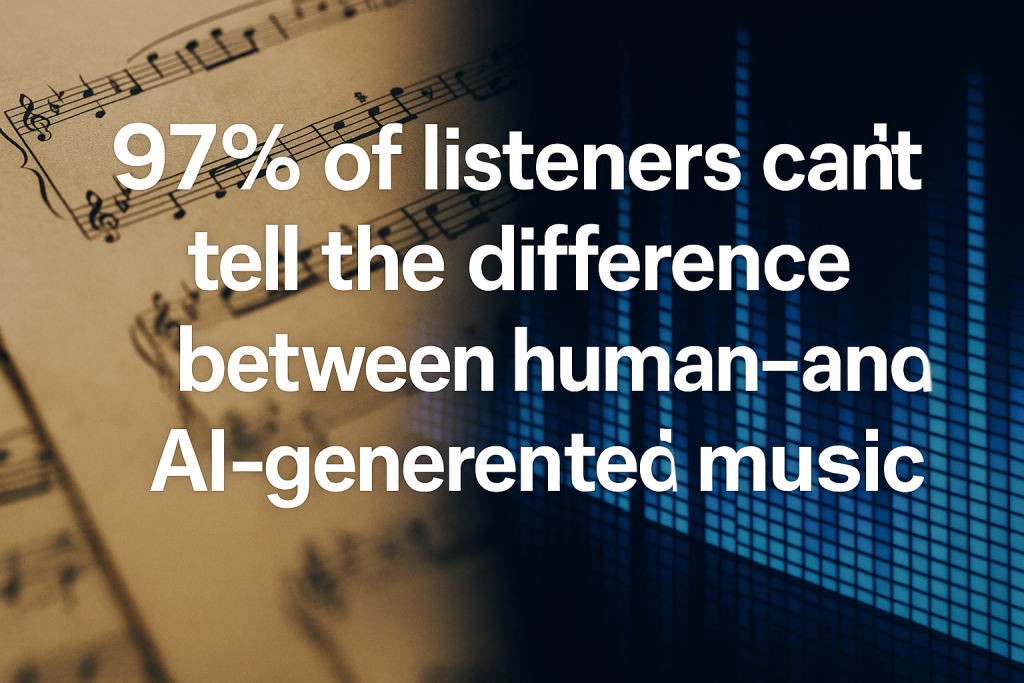97% of Listeners Can’t Tell the Difference Between Human and AI-Generated Music
In a groundbreaking study, Deezer and Ipsos have revealed a striking fact about the state of modern music creation: 97% of global listeners are unable to distinguish between tracks composed by humans and those generated entirely by artificial intelligence. The survey, conducted across eight countries with more than 9,000 participants, highlights how deeply AI has integrated itself into the soundscapes of today’s music streaming era — and how little the average ear can tell the difference.

A New Era of Sonic Confusion
The Deezer–Ipsos survey sheds light on an increasingly blurred boundary between human creativity and machine learning. When exposed to both human-made and AI-composed songs, nearly all participants failed to correctly identify which was which.
This revelation doesn’t just underline the technical sophistication of AI models used in music generation — it also exposes the psychological shift taking place in how audiences experience authenticity. As algorithms learn to replicate tone, emotion, and style with uncanny precision, the line between “artist” and “artificial” becomes more philosophical than ever.
What Listeners Really Think
Beyond the headline number, the study surfaces some fascinating nuances:
- 52% of respondents said they feel uneasy about not being able to tell the difference.
- 45% expressed a desire for streaming platforms to filter or label 100% AI-generated music.
- 66% admitted they would still listen to an AI track out of curiosity.
This mix of curiosity and concern shows that listeners are not necessarily rejecting AI-generated content — but they crave transparency and choice. People want to know what (and who) they’re listening to.
The Human Advantage in a Machine-Driven World
For artists, producers, and independent musicians, this study carries a powerful marketing message: authenticity sells.
In a landscape where nearly every sound can be synthesized, the fact of being human — playing real instruments, crafting mixes manually, building imperfections that evoke emotion — becomes a unique value proposition. House producers, classical composers, or singer-songwriters who emphasize their human touch can stand out by leaning into that narrative.
It’s no longer just about sound design or mastering; it’s about the story behind the track. The origin of a song — who made it, how, and why — becomes part of the art itself.
The Transparency Challenge for Streaming Platforms
Deezer has been one of the first platforms to address AI transparency, advocating for clear labeling of machine-generated content. As AI music tools proliferate, platforms may soon be required to tag songs as “AI-assisted” or “fully AI-generated,” similar to food labeling in the nutrition industry.
This could also affect algorithms that recommend tracks. If listeners begin filtering out AI music, it may reshape recommendation engines and royalty distribution models. Transparency will become not just an ethical issue, but a commercial one.
A Future Filled With AI — and Opportunity
While the rise of AI might sound like a threat to traditional musicians, it also presents a massive creative opportunity. Artists who master these tools can expand their sonic palette, generate ideas faster, and even create hybrid works that fuse human emotion with computational precision.
For professionals in electronic genres — from Afro House to Lo-Fi — AI can act as a co-producer, not a competitor. The challenge is to use it consciously, keeping emotion and intent at the forefront.
Conclusion
The Deezer–Ipsos study is a wake-up call for the music industry. AI isn’t the future of music — it’s already part of its present. As the distinction between human and machine creativity fades, listeners are redefining what authenticity means. For producers who still craft their sound manually, this is not a disadvantage — it’s a story worth telling.
Whether you embrace AI or resist it, one thing is certain: the next big question in music won’t just be “Who made this track?” but “What made it?”
![]()













